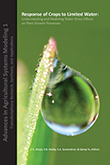Jan 26 2009
Across the globe, the demand for water is increasing with the rise in the world’s population. Expanding urban areas are requiring more water for drinking, sanitation, and industry which is placing added stress on water supplies. In addition, depleting ground water, longer droughts, and the effects of climate change have led to an increased importance for the agricultural industry to optimize irrigation, prevent water pollution, and efficiently allocate water for crop production.
 Response of Crops to Limited Water: Understanding and Modeling Water Stress Effects on Plant Growth Processes
Response of Crops to Limited Water: Understanding and Modeling Water Stress Effects on Plant Growth Processes
A new book, “Response of Crops to Limited Water: Understanding and Modeling Water Stress Effects on Plant Growth Processes,” hopes to tackle these serious water issues. Published jointly by the American Society of Agronomy, Crop Science Society of America, and Soil Science Society of America, “Response of Crops to Limited Water” is a tool for scientists, researchers, modelers, and students who work in crop production with limited water resources.
Each chapter is peer-reviewed with an emphasis on originality, quality, and a synthesis of knowledge. Some of the book’s topics include radiation-use and water-use efficiency for biomass production models, simulating the effects of limited water on photosynthesis and transpiration in field crops, as well as modeling the function of root traits for enhancing water acquisition in crops.
“A thoughtful book, with the indispensable synthesis that is missing from many similar titles,” said the three past presidents of ASA-CSSA-SSSA Kenneth J. Moore, William J. Wiebold, and Gary A. Peterson.
The editors of the book are: Laj R. Ahuja and Saseendran S. Anapalli, USDA-Agricultural Research Service, Fort Collins, CO; Vangimalla R. Reddy, USDA-Agricultural Research Service, Beltsville, MD; and Qiang Yu, Institute of Geographic Sciences and Natural Resources Research, China.
Response of Crops to Limited Water is the first in a new series of books presented by ASA-CSSA-SSSA. The series, “Advances in Agricultural Systems Modeling: A Series of Transdisciplinary Research, Synthesis, and Applications,” will close the knowledge gap in different agricultural processes, typically separated by the various professional disciplines. The goals of the book series include:
- Encourage and advance critical transdisciplinary research, and its synthesis and quantification, through publication of anonymously peer-reviewed papers by top researchers worldwide in a given knowledge gap area.
- Encourage collaboration among the top researchers in new research, synthesis, and building and improvement of model components.
- Encourage and advance the application of system models to solve practical problems through publishing case studies of such applications, along with illustrated instructions on how the models are used.
- Encourage better instruction in these models and their application.
View the table of contents for Response of Crops to Limited Water: Understanding and Modeling Water Stress Effects on Plant Growth Processes at: https://portal.sciencesocieties.org/Downloads/pdf/Response_of_CropsFM.pdf
Response of Crops to Limited Water: Understanding and Modeling Water Stress Effects on Plant Growth Processes, a 452-page hardcover book, can be purchased through ASA-CSSA-SSSA for $90 at: www.societystore.org.